My first visit to Germany was all about cities. For a month Audrey and I rented an apartment in Berlin where we stayed a mere stone throw away from Mauer Park.
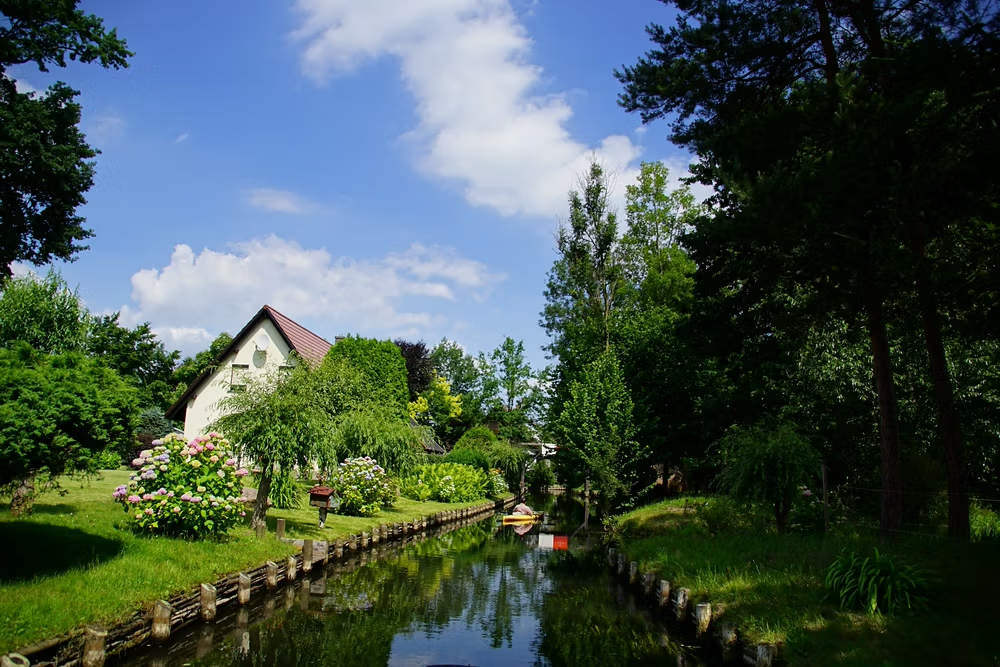
In terms of side trips, we visited other large metropolitan areas such as Leipzig and Frankfurt. It was a solid introduction to Germany, however, this time around we wanted to focus on smaller locales with a specific focus on German culture and traditions. With this in mind our first destination was Spreewald, a quaint German town surrounded by forests and divided by canals.
Mastering The Art Of Slow Travel in Germany
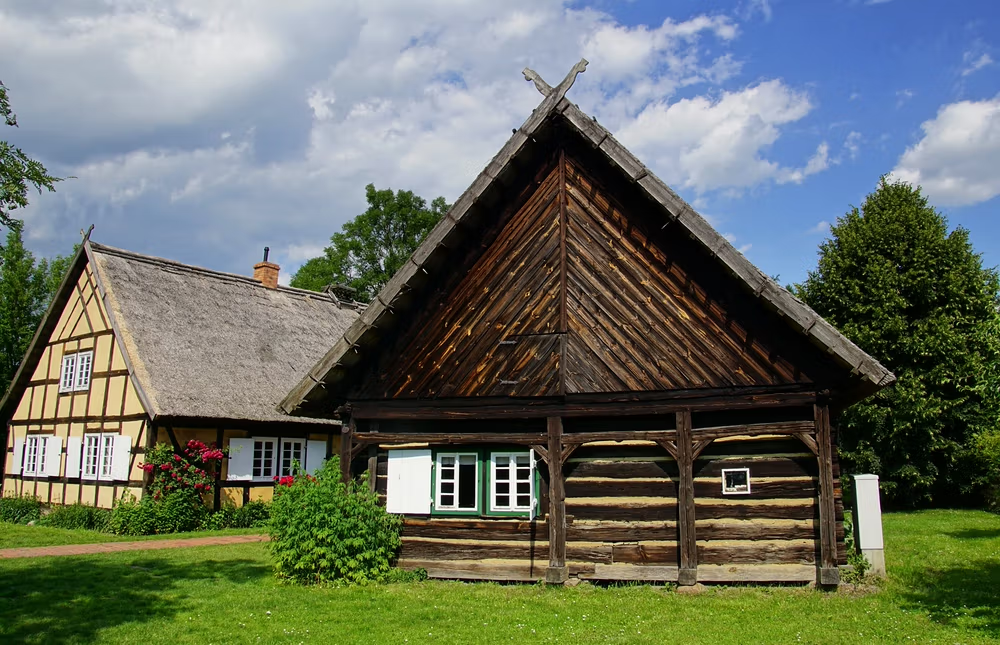
The first thing I noticed upon our arrival was the slower pace of life. Highways and busy city streets were replaced by country roads. Outside of our hotel window we spotted more deer and insects than we did people. After shaking off our jet-lag it was time to delve into the cultural activities on offer. Our first stop was the Freilandmuseum Lehde, an open-air living museum that felt as though we were stepping back in time. Many of the well preserved homes from the 19th century (and earlier) offered a sobering reality as to what life was like centuries ago prior to modern amenities.
Featuring low ceilings functionally designed to preserve heat, I found myself having to duck at times in order to avoid banging my head. Families used to huddle up at night in close quarters with generations rubbing elbows together. It wasn’t uncommon for husband and wife to be sharing a bed with elderly parents or even a child. The concept of theme rooms simply didn’t exist. Bedroom, kitchen and living room were all combined into a room. Functionality and practicality over creative design. I couldn’t help but feel thankful for many of the modern conveniences we enjoy today.
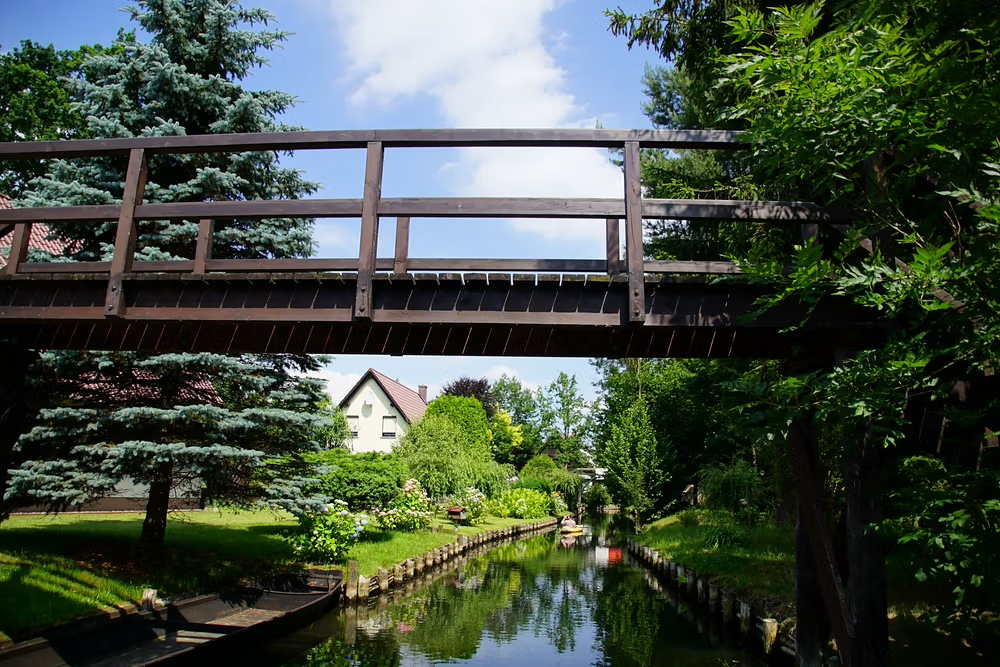
Why Choose Spreewald for Slow Travel?
If you’re looking to embrace the principles of slow travel, Spreewald is the perfect destination. Here’s why:
Unspoiled Nature
Spreewald’s landscape is simply beautiful. Imagine a lush network of rivers, forests, and wetlands all weaving together into a peaceful paradise. As you float through the canals or cycle down quiet paths, you’ll be surrounded by pristine nature, with only the sounds of birds and rustling leaves to keep you company.
- Lush forests: Ideal for nature walks and birdwatching.
- Meandering waterways: Perfect for quiet boat rides and reflecting on the beauty of your surroundings.
- Serene landscapes: Everywhere you look, tranquility abounds.
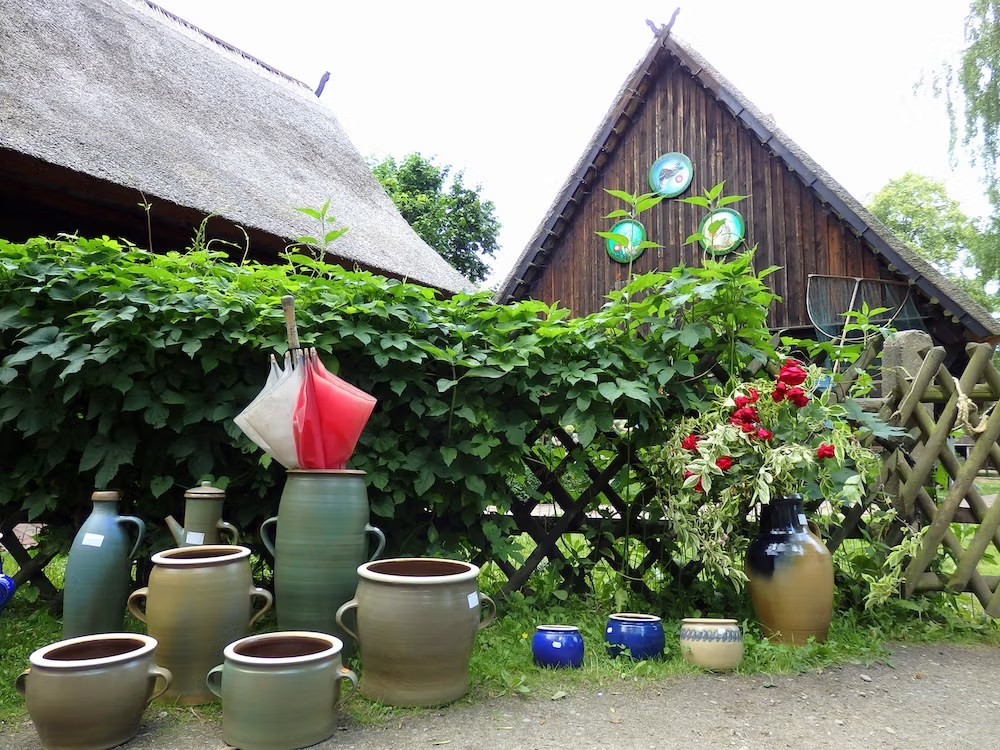
Traditional Lifestyle
One of the highlights of visiting Spreewald is experiencing the rich cultural heritage of the region. The area is home to the Sorbs, a Slavic minority group with a unique language, traditions, and way of life. Their influence can be seen in the local architecture, cuisine, and handicrafts. As you explore the villages, you’ll feel as though you’ve stepped back in time.
- Sorbian culture: Learn about local traditions through festivals, museums, and interactions with locals.
- Historic villages: Discover charming villages with traditional houses, each telling its own story.
- Cultural immersion: Take the time to talk with locals and learn about their way of life.
Slow-Paced Activities
There’s no need to rush when you’re in Spreewald. The region encourages you to take your time and engage in activities that help you connect with nature and the local culture. From cycling along quiet paths to punting through Spreewald’s famous canals, each experience invites you to slow down and soak in your surroundings.
- Cycling: Explore the region’s hidden gems and quiet corners at your own pace.
- Punting: Punt through calm waterways and get up close with nature.
- Walking: Take leisurely strolls through forests, fields, and villages.
Tip: Embrace a slower pace by opting for eco-friendly transportation like bicycles or canoeing through the Spreewald waterways.
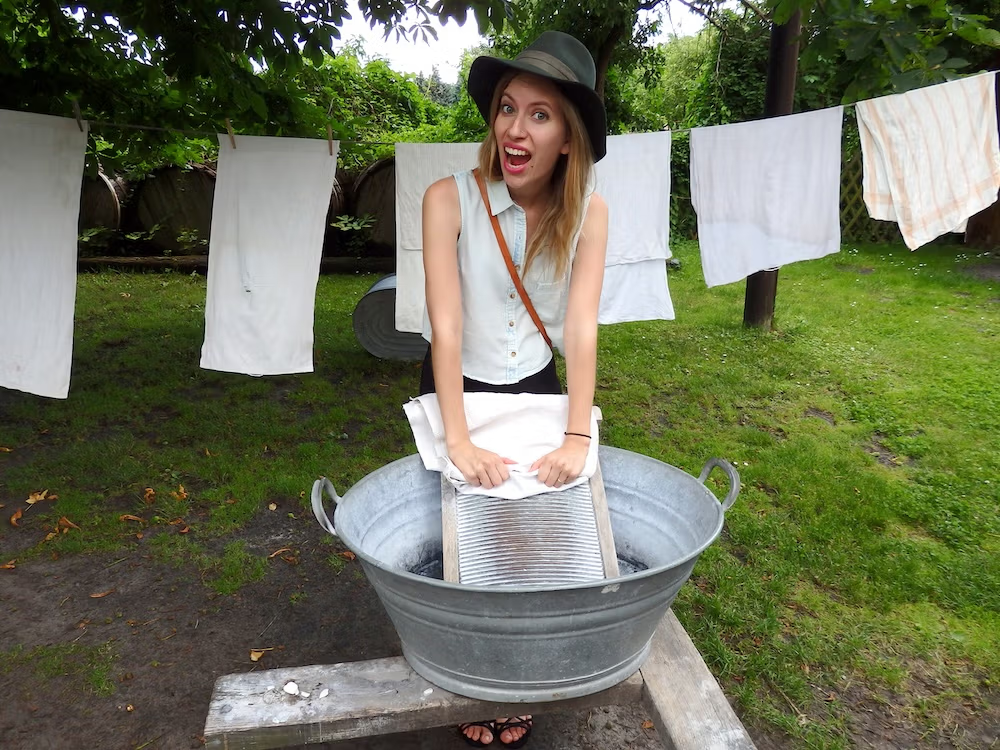
Top Activities for Slow Travel in Spreewald
Here are some of the best activities to consider for those seeking slow travel in a destination like Spreewald.
German Open Air Museum
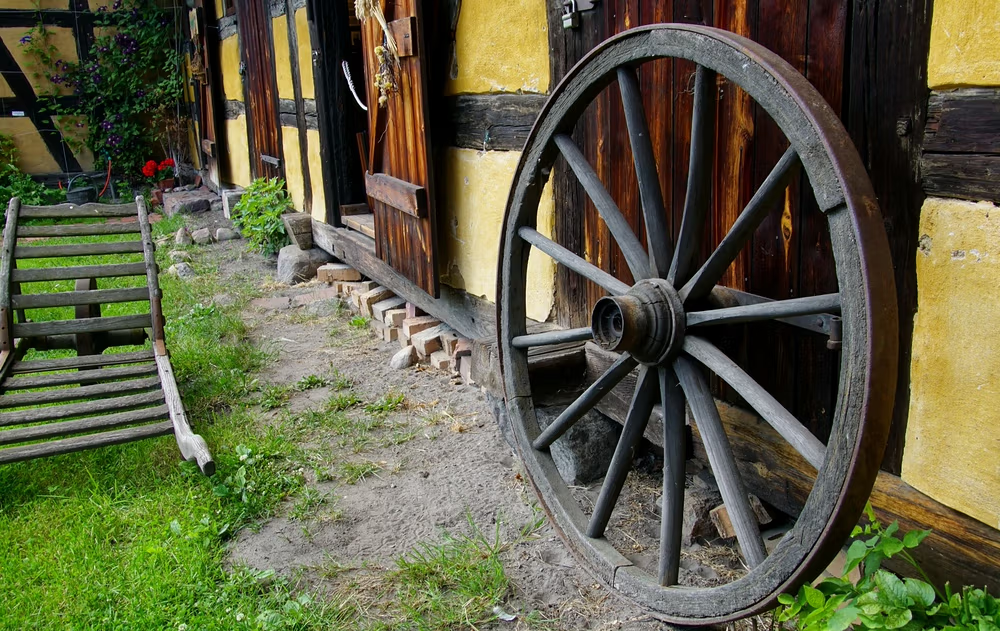
Visiting the German Open Air Museum in Spreewald is like stepping into a time capsule. This charming museum showcases traditional German homes, giving visitors a glimpse into life as it once was in this picturesque region.
As we continued to tour the premises one of my favorite sections were the outdoor games. Old familiar favorites, such as the potato sack race, were on display. Even as a cumbersome 30 something year old I enjoyed hopping around like a kid again. Things became somewhat more challenging when it came time to try stilt-walking. Trying to get both feet on the foot rests proved more difficult than I expected. After nearly twisting my ankle I finally gave up.
- Potato sack race: A classic game that’s fun for all ages.
- Stilt-walking: Surprisingly tricky but adds to the fun and challenge.
- Interactive exhibits: Perfect for families and individuals who want a hands-on experience.
Tip: Don’t be afraid to jump in and participate in these activities! You might just surprise yourself with how much fun they are—even if you aren’t as agile as you used to be.
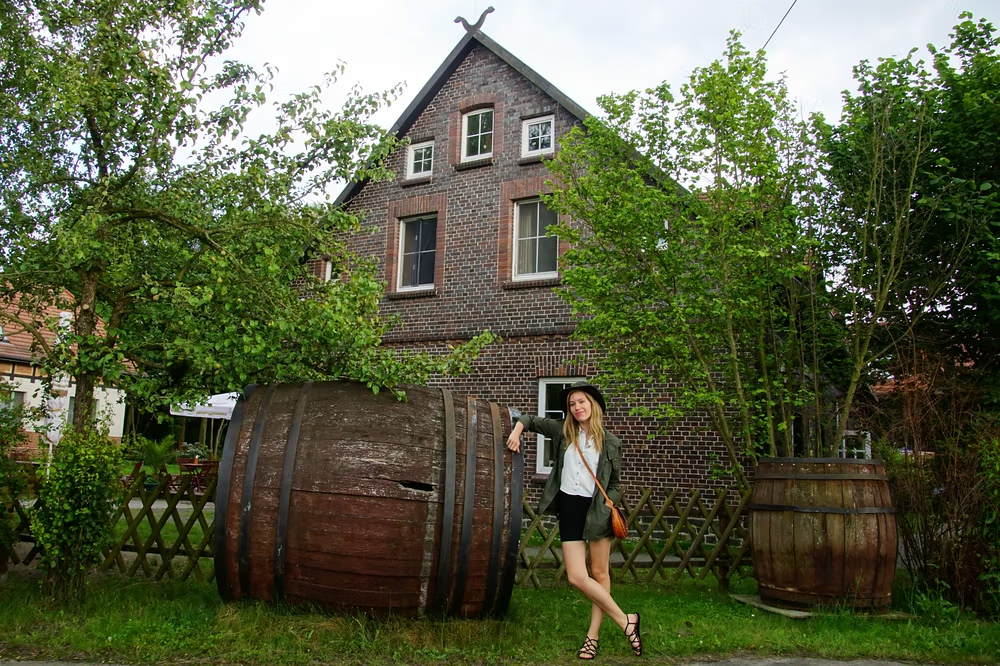
Reflecting on Time and Change
Overall, the visit to this cultural museum was an immersive experience that allowed us to step back in time for over an hour. I left with a greater appreciation of how times have changed rapidly in recent decades/centuries. I can only wonder, sometime in the not too distant future, when relics of my childhood may be on display in an open-air museum.
- Traditional homes: Offering a glimpse into the craftsmanship of the past.
- Outdoor games: Bringing history to life through interactive activities.
- Cultural immersion: An educational and enjoyable experience for all ages.
Tip: Take your time as you explore the museum. There’s so much to see, touch, and learn, and the more you engage with the exhibits, the more you’ll appreciate the rich history of Spreewald.
German Pickle Museum
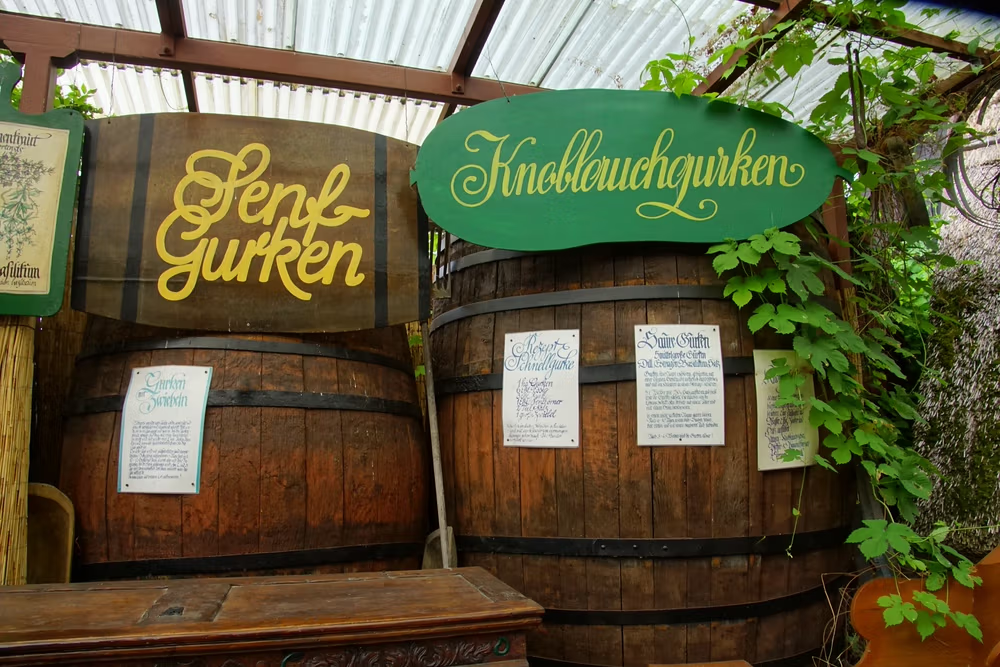
When it comes to quirky travel experiences, visiting a pickle museum might not be at the top of most people’s travel wish lists. But if you’re in Spreewald, Germany, this quirky gem is an absolute must-visit. Known as the Gurkenmuseum (Pickle Museum), this little corner of Spreewald is dedicated solely to the region’s most famous export: pickles. It might sound unusual, but trust me, it’s anything but boring.
Our Experience Visiting the Gurkenmuseum
After wandering back to our hotel it was time to visit the Gurkenmuseum. Now I’ve been to several food museums over the years, however, I’ve yet to encounter anything quite as quirky as a museum dedicated solely to the production of pickles. One might think such a niche museum would be boring; it was anything but. On the walls were photos of ladies who had been championed ‘cucumber queen’ from years past. Each one of them vying for the top recipe of the year.
The winner, was fortunate enough to have her recipe used and produced locally until the next champion was crowned. With several samples on offer we couldn’t wait to do a taste test. I naturally selected the winning recipe first and enjoyed the deliciously sweet taste of the pickles. My favorite one though was a more salty and sour mixture featuring mustard which made Audrey scrunch up her face.
- Cucumber Queen competition: Local women compete for the best pickle recipe each year.
- Historic photos: The walls are adorned with photographs of past winners, showcasing their pride and accomplishments.
- Local production: The winning recipe is produced and sold locally until the next competition.
Tip: Don’t miss the chance to learn about the local pickle-making process, which has been passed down for generations. It’s more intricate than you might think!
Punting In Germany
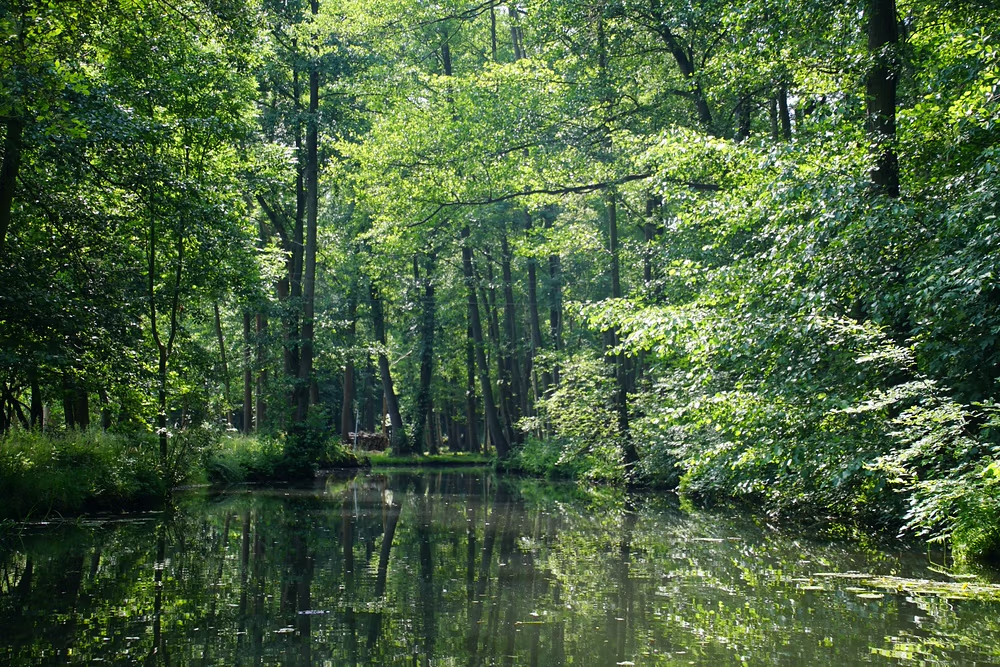
On our second day we awoke to spot a deer outside of our lodge window. In many ways, it was an auspicious precursor to what would be an entire morning dedicated to exploring the plethora of canals by punt.
What exactly is punting you say?
A punt is a flat-bottomed boat featuring a square-cut bow, designed specifically for navigating shallow rivers. It is propelled by a pole, typically 4 to 5 meters long. As we sat down and relaxed taking in all of the wildlife, forests and isolated traditionally built German homes we passed on the canals, I couldn’t help but marvel at the technique and stamina of our punter guide.
With graceful skill he pushed our boat down the shallow river bed. At one point in time these punts were used to transport animals, and today mail is delivered to homes on tiny islands. I was almost tempted to give it a try, however, my previous experiences doing such things as standup paddleboarding in Finland made me think twice given my lack of coordination on the water. Instead I gladly captured as many photos and video clips as possible.
- Punter’s skill: A combination of strength, balance, and experience.
- Graceful movements: Watching the punter navigate the boat is part of the experience.
- Attempt or relax?: While tempting to try, punting requires more coordination than it appears.
Tip: Keep your camera ready—there’s so much natural beauty to capture as you glide through the canals.
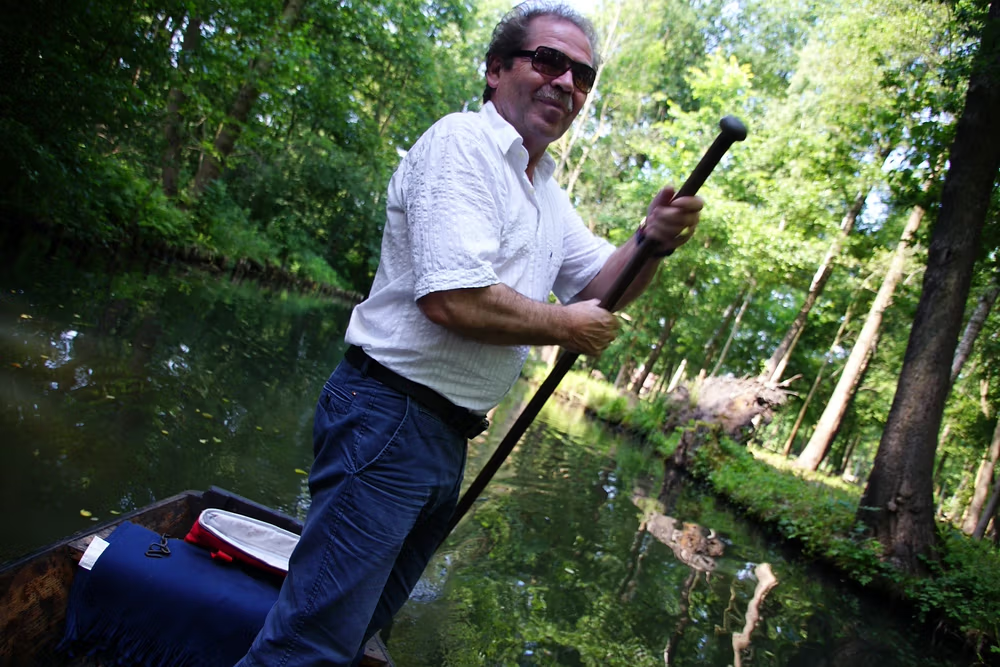
Here are some more photos from our time spent in Spreewald:
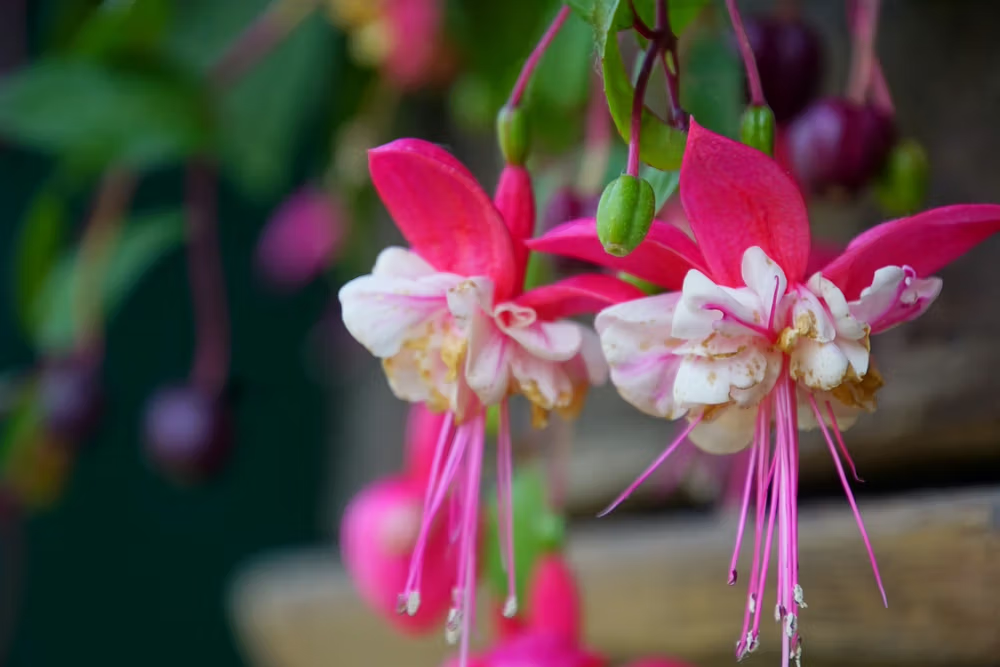
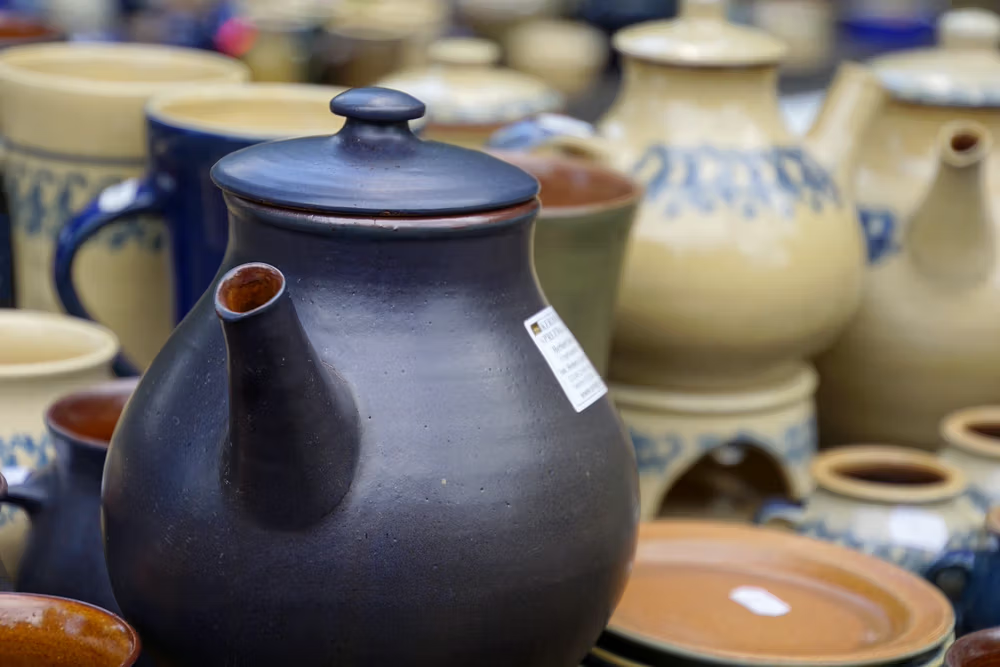
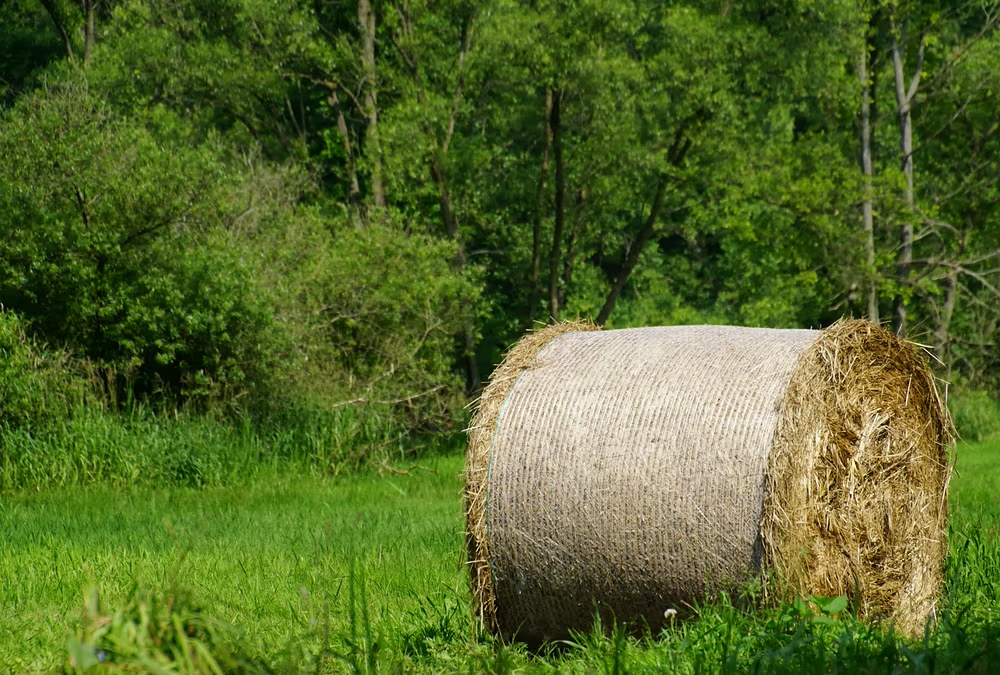
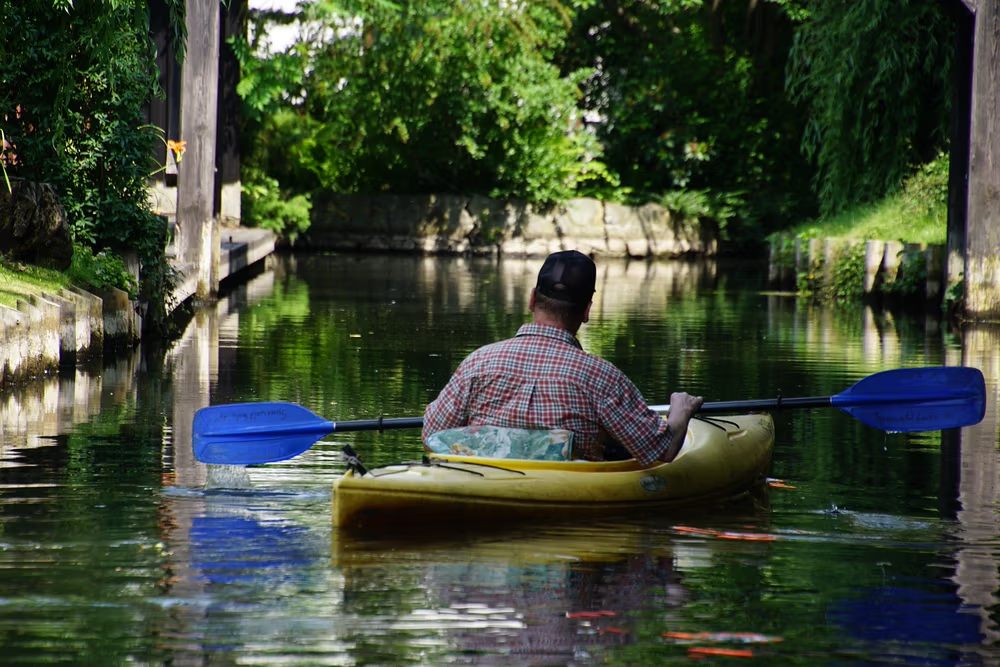
Best Time to Visit Spreewald for a Relaxed Experience
Choosing the right time to visit Spreewald can make a big difference in your travel experience. Each season offers its own charm, but some times of the year are particularly suited to slow travel.
Spring and Summer
From April to September, Spreewald is in full bloom. The forests and meadows come alive with vibrant greenery, and the waterways sparkle under the warm sun. This is the best time for outdoor activities, whether you’re paddling down a canal or cycling through scenic paths.
- Mild weather: Ideal for outdoor activities like cycling and canoeing.
- Blooming nature: Enjoy the beauty of wildflowers and lush green landscapes.
- Extended daylight: Take advantage of long days to explore more at a relaxed pace.
Autumn
If you’re looking for a quieter, more reflective time to visit Spreewald, consider the autumn months. From September to November, the region is bathed in warm, golden hues as the leaves change color. The crisp air and fewer crowds make this the perfect time for picturesque walks and soaking in the natural beauty.
- Crisp air: Perfect for long walks through forests and along the canals.
- Changing leaves: A stunning display of fall foliage.
- Quieter atmosphere: Fewer tourists, allowing you to enjoy a peaceful experience.
Tip: Visit in late spring for ideal temperatures, blooming gardens, and fewer tourists.
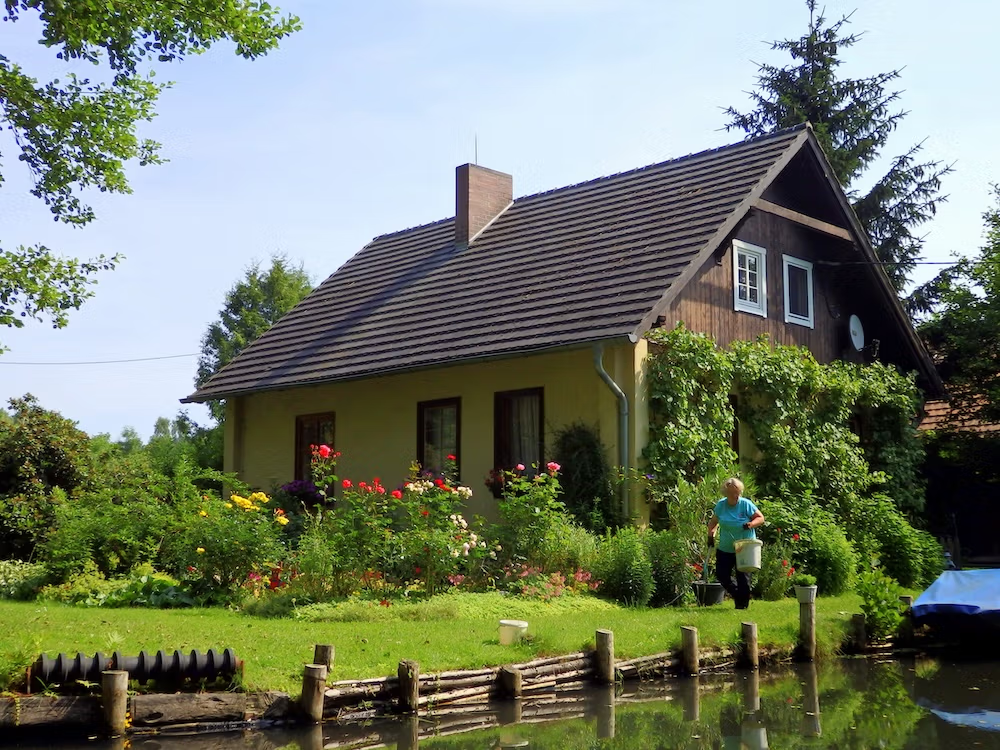
Immerse Yourself in Local Culture and Traditions
Slow travel is all about connecting with the culture of the place you’re visiting. In Spreewald, the local Sorbian culture adds a rich layer of history and tradition to your experience.
Sorbian Culture
The Sorbs are a Slavic minority group that has lived in Spreewald for centuries. Their unique traditions, language, and way of life are still very much alive in the region today. Visiting museums or attending local festivals can give you a deeper understanding of their culture.
- Learn about local traditions: Festivals, music, and art play an important role in Sorbian culture.
- Visit museums: Discover the history of the Sorbs and their contribution to the region.
- Meet locals: Engage with the Sorbian people and learn about their way of life firsthand.
Local Crafts
Spreewald is known for its artisan crafts, many of which have been passed down through generations. Basket weaving is one of the most traditional crafts in the region, and visiting an artisan workshop is a wonderful way to see these skills in action.
- Watch artisans at work: Visit local workshops to see basket weaving and other crafts.
- Handmade souvenirs: Purchase authentic, handmade items directly from artisans.
- Support local traditions: By purchasing local crafts, you help preserve these traditional skills.
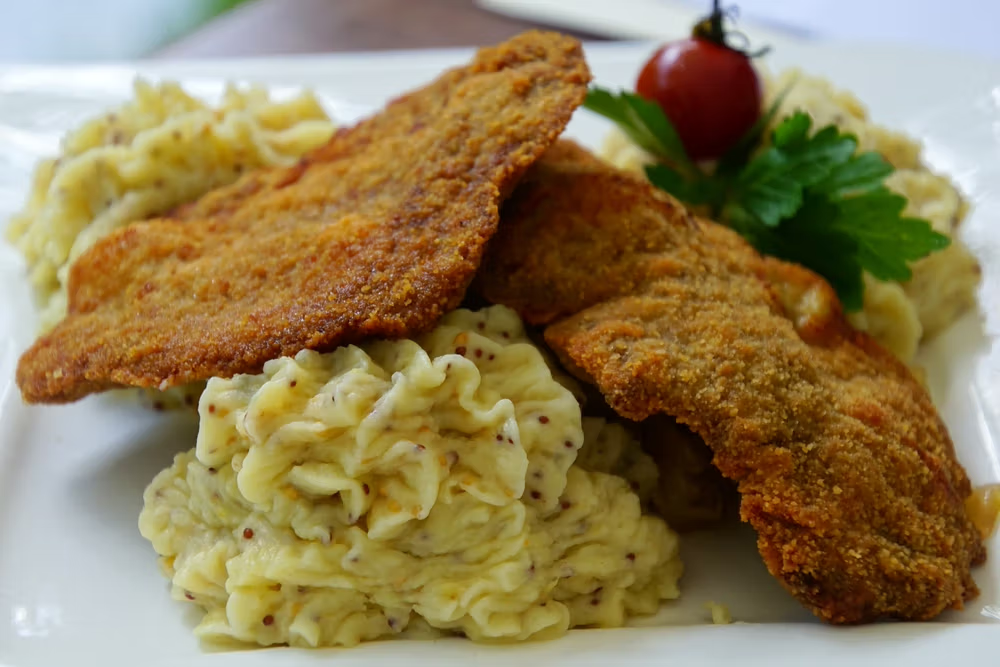
Culinary Delights
No visit to Spreewald would be complete without indulging in the local cuisine. The region is famous for its Spreewald pickles, but there’s so much more to taste! Traditional Sorbian dishes, made with fresh, local ingredients, offer a delicious way to immerse yourself in the culture.
- Spreewald pickles: A must-try specialty of the region.
- Traditional dishes: Savor hearty, flavorful meals made with locally sourced ingredients.
- Local markets: Visit farmers’ markets to taste fresh, seasonal products and homemade treats.
Tip: Don’t miss the chance to visit local markets for fresh, seasonal products and homemade treats.
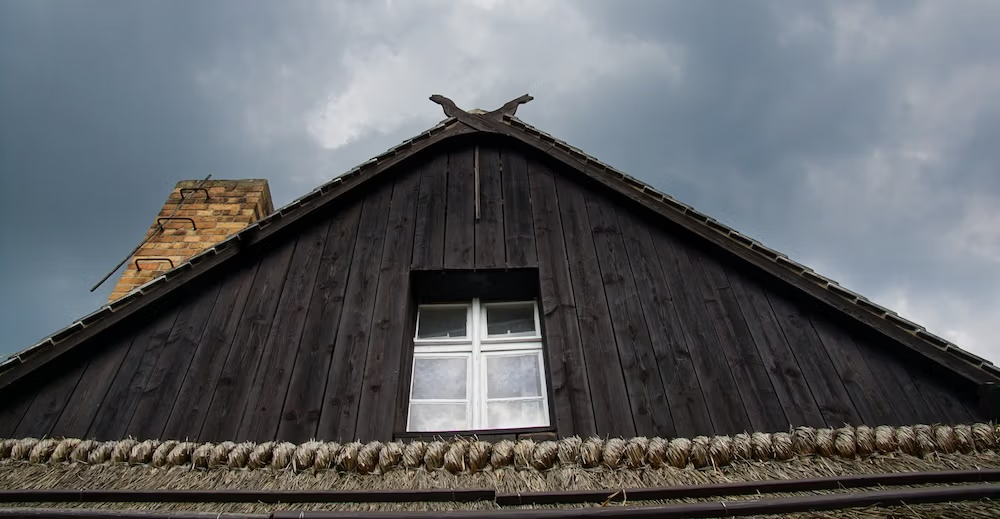
Where to Stay in Spreewald for a Slow Travel Experience
Accommodation plays an important role in slow travel. In Spreewald, you’ll find plenty of options that allow you to experience the region’s charm while maintaining a slower, more relaxed pace.
Traditional Guesthouses
For an authentic experience, stay in a traditional guesthouse. These cozy accommodations are often run by local families and offer a warm, welcoming atmosphere. It’s the perfect way to feel at home while exploring the region.
- Cozy atmosphere: Enjoy the comfort of a home-like setting.
- Local character: Each guesthouse reflects the culture and traditions of the area.
- Personal touch: Hosts often provide insider tips and stories about the region.
Eco-friendly Hotels
If you’re passionate about sustainability, there are plenty of eco-friendly accommodations in Spreewald. These lodges and hotels focus on minimizing their environmental impact while providing comfortable, nature-inspired stays.
- Sustainability-focused: Stay in accommodations that prioritize eco-friendly practices.
- Nature-friendly design: Enjoy modern comforts while staying close to nature.
- Environmentally conscious: Support businesses that are committed to preserving the region’s beauty.
Farm Stays
For a true countryside experience, consider staying on a local farm. Not only will you enjoy the peace and quiet of rural life, but you’ll also get a glimpse into traditional farming practices. Many farm stays offer the chance to participate in farm activities, such as harvesting crops or feeding animals.
- Authentic countryside experience: Immerse yourself in the rhythms of rural life.
- Fresh, local food: Enjoy farm-to-table meals made from ingredients grown on the property.
- Support rural tourism: Staying at a farm helps sustain local agricultural communities.
Tip: Opt for accommodation in smaller villages to fully experience the slow-paced life of Spreewald.
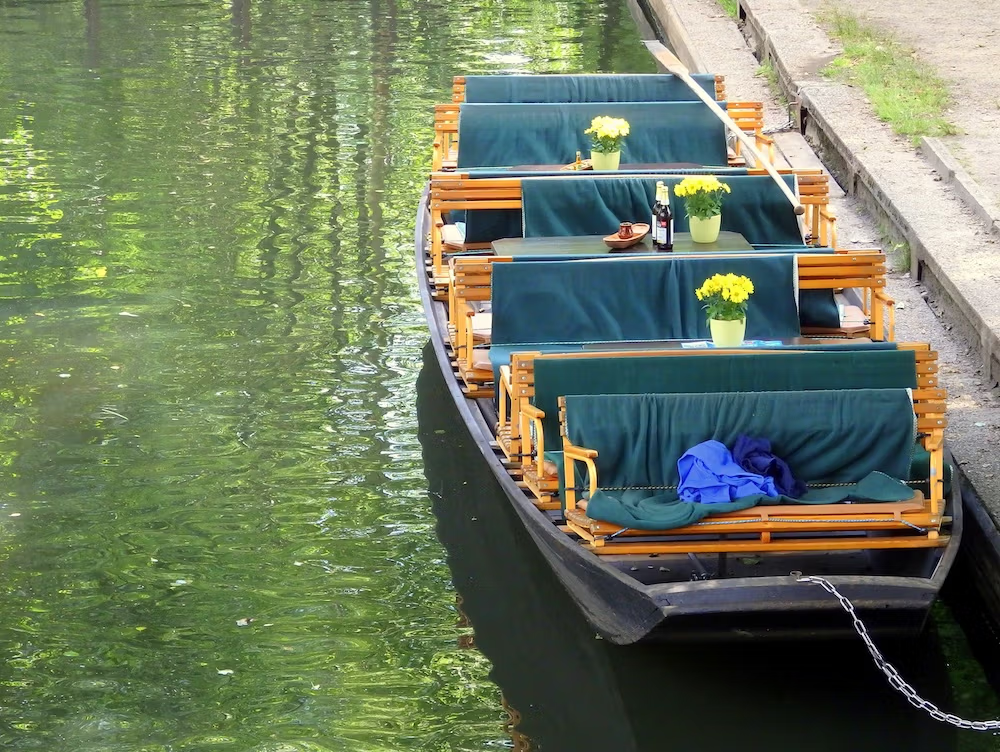
Getting to Spreewald and Transportation Options
Getting to Spreewald is easy. And once you’re there, the best way to explore is by sustainable transportation. Here’s how you can reach and navigate this peaceful region.
Train Travel
Traveling by train is the most sustainable and relaxed way to reach Spreewald. The region is well connected by train to nearby cities like Berlin and Dresden. From these cities, you can hop on a train and be in Spreewald in under two hours.
- Berlin to Lübbenau: A direct train from Berlin takes about an hour.
- Dresden to Lübbenau: It’s a two-hour journey from Dresden by train.
- Comfort and convenience: Sit back, relax, and enjoy the scenic journey to Spreewald.
Cycling and Walking
Once you’ve arrived in Spreewald, the best way to get around is by cycling or walking. The region is perfect for slow travel, with plenty of bike paths and walking trails that allow you to explore at your own pace.
- Rent a bike: Many towns in Spreewald offer bike rentals, making it easy to cycle through the region.
- Walk along the canals: Enjoy peaceful walks along the waterways, surrounded by nature.
- Eco-friendly travel: Reduce your carbon footprint by cycling or walking instead of driving.
Public Transport
If you prefer not to cycle or walk, public transport is a convenient option for getting around Spreewald. Local buses connect the towns and villages, allowing you to explore without the need for a car.
- Regular bus services: Easy access to key points in the region.
- Affordable and eco-friendly: Public transport is a great way to reduce your environmental impact.
- Connect with locals: Riding the bus gives you a chance to interact with residents and learn more about the area.
Tip: Take the train from Berlin to Lübbenau, the gateway to Spreewald, and rent a bike to explore the area.
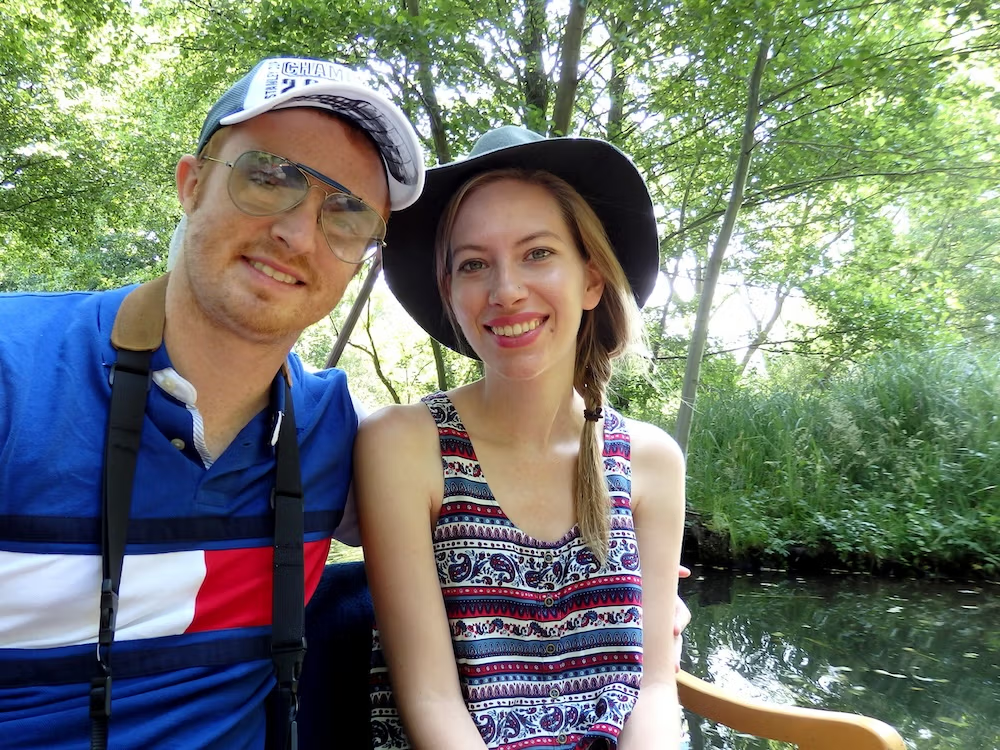
How Many Days Do You Need in Spreewald?
If you’re coming from Berlin or Dresden, it’s tempting to treat Spreewald as a quick day trip. You can do that… but you’ll only get a taste.
Because Spreewald is a protected UNESCO Biosphere Reserve with a huge network of canals, wetlands, meadows, and forest, it really rewards time.
Here’s a simple way to think about it:
| Length of Stay | Vibe | What You’ll Realistically Do |
|---|---|---|
| 1 day | Teaser | Punting tour + short village wander, quick pickle tasting |
| 2 days | Relaxed intro | Punting, bike ride, open-air museum, one long meal, a few walks |
| 3–4 days | Slow-travel sweet spot | Multiple canals, different villages, spa time, markets, museum, long forest walks |
| 5+ days | Full exhale | Proper digital detox, several bases, reading, writing, napping, repeating |
If slow travel is the goal, aim for at least 2 nights, and if you can stretch to 3–4, you’ll actually feel your shoulders drop.
Choosing Your Base in Spreewald
Spreewald isn’t a single town; it’s a whole region. The three main bases most visitors consider are Lübbenau, Burg (Spreewald) and Lübben. They each have a slightly different personality.
Quick Base Comparison
| Base | Vibe | Best For | Car-Free Friendly? | Don’t Miss |
|---|---|---|---|---|
| Lübbenau | Classic canal town | First-timers, punting, postcard views | Yes – great with trains + bikes | Harbour area, traditional punts, pickle stalls |
| Burg (Spreewald) | Spread-out countryside | Spa lovers, walkers, cyclists | Manageable, but bike helps a lot | Spas, village lanes, quiet canals |
| Lübben | Small town hub | Budget stays, families, onward travel | Yes – train connections | Castle island, riverside paths |
You can’t really go wrong, but Lübbenau makes life easiest for a first slow-travel visit, especially if you’re coming in by train and want to walk or cycle everywhere.
Lübbenau: Classic Spreewald Postcard
If you picture wooden punts gliding past old houses and lush canalside gardens, you’re probably imagining Lübbenau.
- Why base yourself here
- Short walk from the train station to town.
- Lots of choice for punting tours and kayak rentals.
- Easy to stitch together short walks, long lunches, and lazy canal time.
- Nice slow moments
- Sitting on a bench along the harbour, just watching punts glide in and out.
- Stopping at a pickle stand for a quick snack between walks.
- Wandering tiny side streets in the evening when the day-trippers are gone.
If it’s your first Spreewald escape, this is the easiest “no-thinking-required” base.
Burg (Spreewald): Rural, Spa, Deep Exhale
Burg feels more spread out and rural, a patchwork of farmhouses, canals, and fields rather than one compact town centre.
- Why stay here
- Great if you want space, quiet, and wellness.
- Lots of little bridges, wooden houses, and walking paths that start practically from the doorstep.
- Spa hotels and thermal pools are a big draw if you like soaking after a day outdoors.
- Best with
- A bike (or e-bike) so you don’t end up walking the same stretch of road repeatedly.
- A few extra days – Burg shines when you can linger, not rush.
If you’re dreaming of reading a book on a terrace surrounded by trees and then hitting the spa, Burg is your spot.
Lübben: Small Town With Easy Connections
Lübben sits slightly more “urban” than Lübbenau or Burg, but it’s still very much Spreewald.
- Good reasons to choose Lübben
- Train connections work well if you’re hopping around Germany.
- Simple hotel options and supermarkets – handy for longer stays.
- A nice balance between nature access and everyday conveniences.
- Slow-travel perks
- Stroll to the castle island and linger by the river.
- Set up a base if you’re combining Spreewald with other Brandenburg towns.
If you like having a proper grocery store, a pharmacy, and the forest all within reach, Lübben is a comfortable choice.
Slow-Travel Itineraries for Spreewald
2-Day Spreewald Taster (Without a Car)
Perfect if: you’re coming from Berlin or Dresden, want to unwind, but don’t have a full week.
Day 1 – Canals, Culture, and Pickles
- Arrive in Lübbenau late morning.
- Drop bags at your guesthouse and head straight to the harbour for a punting tour.
- Choose a 2–3 hour route so you’re not sprinting through your day.
- Bring a light jacket – the shade over the canals can feel cooler than you think.
- Lunch at a canalside restaurant: go for something hearty – schnitzel, fish, potatoes – you’ll walk it off later.
- Afternoon:
- Wander through the old streets.
- Grab a jar (or three) of Spreewald pickles to take home.
- Evening:
- Slow dinner, an evening stroll by the water, early night.
You’ll sleep well after that boat ride.
Day 2 – Biking, Forest, and Village Time
- Rent a bike or e-bike after breakfast.
- Follow one of the signed routes out into the forest and villages.
- Look for paths that loop between canals, meadows, and small settlements.
- Stop for coffee and cake at a village café; this is slow travel, dessert counts as sightseeing.
- If you have time before your train:
- Visit a small museum or craft workshop.
- Stock up on local products – pickles, honey, herbal teas – for later.
Then roll back to the station, pleasantly tired instead of wiped.
3–4 Day Deep-Dive Spreewald Escape
With three or four days, you can breathe a bit deeper.
Day 1 – Arrival and First Punting Trip
Do the same relaxed arrival day as above, without feeling like you need to “tick everything off”.
Day 2 – Open-Air Museum and Village Walks
- Take the day to focus on open-air history, old farmhouses, and village lanes.
- Plan a long lunch somewhere with outdoor seating.
- Wander until you’re ready for nothing more than a nap and an early dinner.
Day 3 – Bike the Canals and Fields
- Commit to one big bike day.
- Choose a circular route of 30–40 km if you’re comfortable, less if you prefer to dawdle.
- Pack water, snacks, and a simple picnic lunch.
- Stop whenever something catches your eye: a tiny bridge, a field of wildflowers, an old wooden house.
If you stay a fourth day, make it a “do whatever you feel like” day: spa, reading, a second punting trip, or just sitting by the water doing nothing. That “nothing” is secretly where slow travel really happens.
Eating and Drinking Slowly in Spreewald
Spreewald’s big celebrity is of course the pickle, but there’s a lot more going on at the table.
What to Look for on Menus
- Spreewaldgurken – local pickles in different marinades: sweet, sour, spicy, mustardy.
- Fish dishes – river fish and freshwater favourites, often simply prepared.
- Hearty mains – schnitzel, roasts, potatoes in many forms; great after cool days on the canals.
- Seasonal specials – asparagus in spring, mushrooms in autumn, berry desserts in summer.
Pair all of that with a beer or a glass of local wine, and suddenly that “just one more night here” idea doesn’t sound so crazy.
Slow-Food Moments to Seek Out
- A long breakfast at your guesthouse with fresh bread, cheese, meats, jams, and strong coffee.
- Kaffee und Kuchen (coffee and cake) mid-afternoon, preferably outdoors.
- A simple picnic by the water with bread, cheese, pickles, and fruit from a local market.
You don’t need fancy tasting menus here. Simple, local, and fresh fits the slow-travel brief perfectly.
Budget Snapshot: What a Slow Trip to Spreewald Costs
Prices will shift over time, but this gives you a ballpark per-person per day (excluding flights in/out of Germany):
| Style | Daily Estimate | What That Feels Like |
|---|---|---|
| Budget | ~€60–€80 | Guesthouse or simple hotel, self-cater some meals, one paid activity a day |
| Mid-range | ~€90–€130 | Comfortable hotel or guesthouse, restaurant meals, punting + bike rentals |
| Comfortable / Spa | €150+ | Spa hotel, full restaurant meals, multiple tours, maybe a massage or thermal spa visit |
You can keep costs down by:
- Traveling by regional trains rather than renting a car.
- Choosing lunch as your main big meal and going lighter at dinner.
- Sharing bike rentals and picnics instead of eating out for every meal.
Slow travel doesn’t have to mean “blow the budget” – it just means spending your money on time and experience instead of constant movement.
Practical Tips for a Relaxed Spreewald Escape
Packing for Canal Country
Weather in Spreewald can be changeable, and the shade over the canals often feels cooler than the thermometer suggests.
Consider packing:
- A light waterproof jacket and a warm layer, even in summer.
- Comfortable walking shoes that can handle a bit of mud on forest paths.
- A scarf or buff for breezy boat rides.
- Insect repellent – wetlands mean bugs when it’s warm and still.
- A dry bag or zip-lock if you’re bringing a camera or phone on the water.
Staying Mostly Car-Free
One of the nicest parts of Spreewald is how easy it is to enjoy it without getting behind the wheel.
- Use trains to get in and out, then bikes, feet, and boats once you’re there.
- Ask your guesthouse where the nearest bike rental is – they’ll usually point you to someone local.
- Check bus schedules in advance if you want to hop between bases without pedaling.
You’ll spend more time looking at trees and canals than at parking signs. That’s a win.
Travelling With Kids or Multigenerational Family
Spreewald is surprisingly good for family slow travel:
- Kids love:
- Boat rides (especially if they can sit at the front and “help” spot wildlife).
- Old-fashioned games at open-air museums.
- Animals around farms and fields.
- Grandparents appreciate:
- Flat walking paths.
- Benches and cafés at regular intervals.
- The unhurried rhythm of days built around one or two main activities.
Keep days simple: one big outing (punting, museum, bike loop) plus lots of downtime.
Giving Yourself Permission to Do Less
It’s easy to arrive with a long list of “must-see” spots and then accidentally recreate a city-break pace in the countryside.
Spreewald’s a good place to practice the opposite:
- Pick one or two things per day and treat everything else as a bonus.
- Don’t feel bad about an afternoon nap or two hours with a book.
- Say yes to slow breakfasts and long, meandering dinners.
The point here isn’t to conquer a checklist. It’s to let the place work its way under your skin.
Combining Spreewald With Other Destinations
Because the region sits roughly 100 km south of Berlin, it makes an easy add-on to a city trip before or after.
A few ideas:
- Berlin + Spreewald (4–6 days)
- 2–3 days in Berlin for museums, history, and food.
- 2–3 days in Spreewald to decompress, punt, and wander.
- Dresden, Saxon Switzerland + Spreewald (6–8 days)
- Baroque architecture and art in Dresden.
- Hiking and viewpoints in Saxon Switzerland.
- Finish with 2–3 days of flat walks and gentle canals in Spreewald.
- Brandenburg countryside loop
- Use Spreewald as your anchor and build out a loop of smaller towns and lakes in the wider region.
Think of Spreewald as the “exhale” chapter of your German trip: the part where you finally slow down enough to taste your coffee properly, notice the way the light hits the water, and maybe hear your own thoughts again.
If big cities are the adrenaline rush of travel, Spreewald is the deep breath you didn’t realize you needed.
Spreewald Slow Travel FAQ: Real-World Questions, Honest Answers & Relaxed Tips
How many days do you really need in Spreewald for slow travel?
If slow travel is your goal, I would treat 2 nights as the bare minimum and 3–4 nights as the real sweet spot. With 2 nights you can do a punting trip, one good bike ride and an open-air museum without rushing; with 3–4 you add long walks, markets and proper downtime where you are not checking the clock every hour.
Is Spreewald an easy day trip from Berlin, or should I stay overnight?
Both. Spreewald absolutely works as a day trip from Berlin if that is all you have, but it will feel like a beautiful teaser rather than the full story. If you stay at least one or two nights you get the quiet evenings after the day-trippers leave, slow breakfasts, misty mornings on the canals and a rhythm that actually feels like the slow-travel version of the place.
When is the best time of year to visit Spreewald for punting and slow travel?
Honestly, there is no bad season, but late spring through early autumn is when Spreewald really leans into its canals and greenery. In spring you get fresh colours and fewer people, summer brings long days on the water and café terraces, and autumn wraps everything in warm golden tones while the paths and boats are noticeably quieter.
Do I need a car in Spreewald, or can I get around by train, bike and boat?
Nope. You do not need a car for Spreewald unless you really love driving. Regional trains connect the area with big cities, and once you are there the combination of walking paths, bike routes, boats and a bit of local bus travel is more than enough to reach the main villages, museums and canal hubs at a relaxed pace.
Where is the best place to stay in Spreewald: Lübbenau, Burg or Lübben?
It depends. Lübbenau is the easiest all-round base for first-timers, with classic canal views, plenty of punting options and a short walk between the station and harbour; Burg feels more rural and spread out, great if you want spa hotels, long walks and a real countryside feel; Lübben works well if you want simple town comforts, good train connections and nature still within easy reach.
How much does a slow trip to Spreewald cost compared with Berlin or Dresden?
In rough terms, the ballpark from the article still holds: on a budget you can get by on around €60–80 per person per day with a simple guesthouse, some self-catered meals and one paid activity; mid-range sits closer to €90–130 with restaurant dinners and punting plus bike rentals; once you add spa hotels and regular tours you are easily at €150+ per day. The nice thing about Spreewald is that slow travel actually helps your wallet a bit, because you are paying for time in nature rather than a packed schedule of pricey attractions.
Do I need to book a punting tour in advance in Spreewald?
Sometimes. In peak summer weekends and holidays it is worth reserving a specific punting tour time, especially if you want a particular route, language or a smaller boat. Outside of those peak periods you can usually just wander down to the harbour, look at the board of departure times and hop on the next punt that matches your mood.
Is Spreewald a good destination for kids and multigenerational family trips?
Absolutely. Spreewald is one of those rare places where toddlers, teens, parents and grandparents can all enjoy the same day without anyone feeling punished. The boats are calm, the paths are mostly flat, there are animals, open-air museums and old-fashioned games to keep younger travellers interested, and the pace is relaxed enough that older family members are not having to sprint to keep up.
What should I pack for a canal and forest trip to Spreewald?
Layers. I would pack a light waterproof jacket, a warm layer for cool mornings and shady canals, comfortable shoes that can handle a bit of mud, a scarf or buff for breezy boat rides, insect repellent for still evenings and a small dry bag or zip-lock for your phone and camera. If you plan on cycling a lot, add padded shorts or at least very comfy trousers, plus a reusable water bottle and some snacks so you are not at the mercy of the next café opening hours.
Is Spreewald safe, and are there any scams or hassles I should watch for?
Yes. Spreewald feels very safe compared with big cities, and most of the time your biggest hazard is getting sunburned on a boat or distracted by scenery while cycling. The usual common-sense stuff still applies – keep an eye on your belongings in busier harbour areas, agree prices and durations before joining a tour or renting a kayak, and be cautious about walking deep forest paths alone late at night – but aggressive scams and hassle are not really part of the vibe here.
Can I visit Spreewald in winter, or is everything closed?
You can. Winter in Spreewald is very quiet and some attractions, cafés and smaller accommodations do shut or run on limited hours, but that can also be part of the charm if you like empty paths and moody landscapes. A few operators run winter punting trips with blankets and hot drinks when water and weather allow, so as long as you come prepared for short days, cold temperatures and a slower schedule, a winter visit can be a cosy, introspective version of the region rather than a write-off.
Is Spreewald accessible if I have limited mobility or use a stroller?
Partly. Many harbour areas, town centres and wider paths are reasonably flat and stroller-friendly, but you will also find uneven forest tracks, narrow bridges and boat landings with steps or gaps that can be tricky with limited mobility. If accessibility is a priority, I would email your guesthouse and a couple of punting companies in advance to ask about ramps, step-free access and accessible toilets, then build your days around the smoother routes and more accessible sections of the canals.
What local food and drink should I try in Spreewald besides pickles?
Pickles are just the start. I would keep an eye out for different styles of Spreewaldgurken from sweet-and-sour to mustard-heavy, simple river fish dishes, hearty mains like schnitzel with potatoes, seasonal specials such as asparagus in spring or mushroom dishes in autumn and anything that showcases local dairy, honey or baked goods. Farmers markets, village bakeries and traditional guesthouses are usually where the most memorable slow-food moments happen.
How can I combine Spreewald with other destinations on the same Germany trip?
The easiest combo is to pair Spreewald with Berlin or Dresden, using the cities for museums and big-ticket sights and Spreewald as your exhale at the end. You can also link it with hiking in places like Saxon Switzerland or a wider Brandenburg countryside loop, treating Spreewald as your base for a few nights of canals, forests and long quiet evenings between more intense parts of the trip.
Final Thoughts: Embracing Slow Travel in Spreewald
Spreewald is the perfect destination for slow travel. When it came time to leave I felt the urge to stay longer. The bustle of cities can be enticing but the lure of peace, quiet and nature seems to be calling my name more often these days.
I visited Spreewald as part of the #JoinGermanTradition campaign organized by the German National Tourism Board.

Slow travel? No guides ?! The paradise exists!
Espero que um dia poder visitar este lugar perfeito… parabéns pelo post
Spreewald looks so cute. I love the traditional style of the houses. The only place I’ve been in Germany is Berlin and although I love the city it’s nice to see some historic things. It must have been great to rent a place and spend the whole month in Berlin too – slow travel is definitely the best way to really get to know a place and I like to spend at least a month in a new place nowadays.
Thanks Anna! Berlin is a cool city but it really feels great to explore the countryside of Germany as well.
Beautiful pics and nice trips. Thank you for sharing
Amazing !!
Wonderful pictures , beautiful places to travel and rest.
Leave the big city stress.
I loved the photos, very beautiful. I hope to visit this place as magnificent.
Really, Wonderful Images, I am crazy about to traveling beautiful places..Thanks for share!
Enjoy this lifestyle, the photos are also amazing!
German is always superb. But the photography is very nice
Just have to say amazing photos, very sharp & in focused. you have a good photography hand.
Wow! This is simply amazing! I absolutely love such old-world, charming, dainty stuff. It doesn’t even look a like museum! I really wnat to visit this particular part of Germany.
Thanks! I agree with you. They’ve done a fantastic job of making it an immersive experience as opposed to one that feels artificial.
i love your idea to make the time to getting to know the culture of the country!! GERMANY is beautiful
Thanks! Indeed, it is a beautiful and diverse country 🙂
I found your website by accident. I loved the photos, very beautiful. I hope someday to visit this place as magnificent.
Thank you very much!
Wow! Superb Images, 19th century homes look awesome!! Wish I could visit there someday.
Thank you! We had a lot of fun trying to capture it with photos and video 🙂
Beautiful images Samuel!
Slow travel is the way to go; better yet if you visit a slow pace of living spot, like this little town in Germany. We dig some convenience but love off the beaten path, slow-moving places. Good for the soul.
Thanks much, and enjoy your travels 🙂
Ryan
Thanks Ryan! We sure enjoyed the slower pace of life and it is a reminder we need to do this more with our independent travels on a regular basis.
Wow, I accidentally found your blog. I visited Berlin 3 years ago, it seems I should go to villages of Germany too.
By the way, your photos seem very clear and beautiful..
Good luck,
Thank you! Indeed, exploring the rural areas of Germany is an entirely different travel experience and one we highly recommend.
Looks great!I myself live in Berlin and have not yet visited the Spreewald. I will definitely consider that for a next weekend-trip, thanks for the nice post! If you want to discover another beautiful nature area with lots of lakes you should check out the Mecklenburgische Seenplatte up North of Berlin – for sure worth a trip!
Thanks Julian! I hope you get a chance to visit soon and I really appreciate the recommendation as well.
What a life! Looks really laidback and relaxing. Were your trip to Spreewald sponsored?
Thank you! We did partner with the German Tourism board but our schedule was quite flexible.
Wow, this has definitely made me want to explore more of Germany! What camera/lens do you use by the way? Your photos are beautifully crisp 🙂
Thanks Kiara! It is a really cool part of Germany. Quite underrated I’d say. These days I’m using a Sony A77II with a Tamron 16-300mm lens.